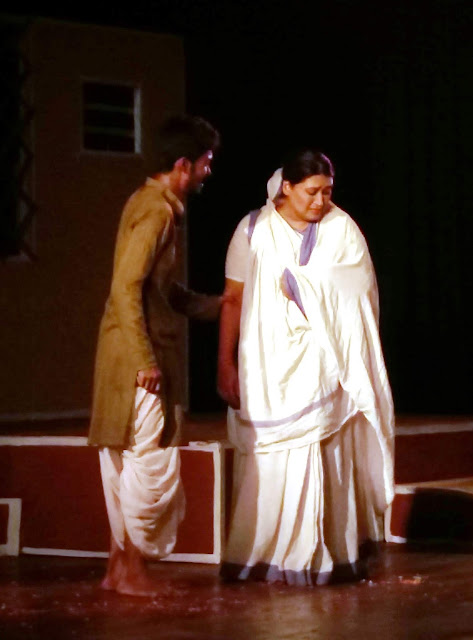The avoidable tale of excruciation
The man was a widower and the woman was a widow. Both were devar (husbands younger brother) and bhabhi (elder brother's wife). There was perfectly no legal or religious hurdles in their re-marry. But yea, there is something called society and dogmas of the so-called high morals of the society. The skewed customs could easily allow a man to re-marry but a woman .... for her it was the greatest sin of the earth notwithstanding the fact that she had no husband alive. The writers of moral codes perhaps lost their sanity which could see the naked truth that the libido is as furious in a woman as that in a man particularly when she is young enough and has yet to cross many many seasons of spring in her way,
Gauri loses her husband in his illness but recollects her and starts spinning the wheel to maintain herself along with her children. Her devar Jayanath is enamoured by her beauty and youthfulness. He makes advances towards her and faces little resistance from her. Gauri gets pregnant after some days and the trails of agony begin here. She has to go to her mother's village to get the eight moths old embryo in her womb aborted. Moreover she bears an indelible stain on her character till her death. People think her a hussy and everyone in her community makes a distance from her. The situation is so worsened that no invitee turns up on the occasion of eating ceremony on the first death anniversary of her late husband. Her son feels very insulted for this. When she goes to her mother's village to take her mother, her grandmother reveals that an eight-month illegitimate embryo was aborted and so the villagers have boycotted his family. The son of Gauri goes to his mother and passes very vituperative remarks on her. From that moment he remains indignant towards her.
On one side Gauri bears inexplicable misery in her life her devar, the main culprit is having a good time of dalliance with so-called young beautiful widows in the holy city of Varanasi. Gauri thinks that her troubles will reduce once her son gets married. But when the new bride comes she starts insulting and abusing her giving her a new spate of sufferings. Gauri is tired and after some days she leaves the world remarkably without telling the name of the man who made her pregnant. In her way, she tried to keep the prestige of her in-laws high and bore all allegations on herself.
The director Sharada Singh conceived each and every scene with the specific nuances. She herself made good use of controlling the speed of rotation of the spinning wheel for conveying the depth of feeling of her dialogue seamlessly. Her actors made good use of the whole stage. The stretching of saree of the widow in Varanasi and popular filmy song played from background went well though perhaps a folk song would have maintained the purity of the tenor of the play.
The performance of artists was superb especially the acting by Sharada Singh (director), who played Gauri and Suman Kumar who played the role of devar Jayanath were impressive. Sharada Singh's dialogue delivery, accent, emphasis along with her telling facial expressions were extremely realistic yet comprehensible to the farthest audience. The son of Gauri was able to express the dilemma he faced because of the perceived sin of his mother. Ruby Khatun had a small role of resisting the command of a dominant villager lady Subanti Banerjee and then a significant role of frolicking widow. She enacted both different characters with judicious finesse. Vinita Singh as the daughter-in-law of Gauri proved a good nagging bahu as required. Subanti Banerjee off course lived truly the role of dogma-enforcing strong villager woman.
Yogesh Tripathi's script has commendably succeeded in preserving the sanctity of Nagarjuna's soul. The music by Sanjay Upadhyay with adept assistance of Raju Mishra and good instrumentalists was supreme in terms of folk elements it assimilated with an appreciably sweetness. The set-design with two raised platform on two corners of the stage presented a symmetric look. The bamboo-stick windows, lantern, wooden seats and baskets, really rotating spinning wheels created a real village scene on the stage and set-designer must get credit for this. The dresses of the artists were as the villagers should wear maintaining the discreet colourful variety in the sarees of the villagers and Jayanath. One more special element in the show was the stunning dance performance by a young monk giving violent twists to his body and yet striking a balance of the mini firepits with the help of mouth and arms.
The show as a whole was a feast to the art lovers of Patna. The organisation 'prastuti' won heartfelt admiration for its high level of theatrics.
...............
Review by- Hemant Das 'Him'
Photographs by - Binay Kumar
E-mail- editorbiharidhamaka@yahoo.com
Note: This piece of review is the quickly prepared one. It may contain some errors that could be removed after Raksha-bandhan festival.





































































No comments:
Post a Comment
अपने कमेंट को यहाँ नहीं देकर इस पेज के ऊपर में दिये गए Comment Box के लिंक को खोलकर दीजिए. उसे यहाँ जोड़ दिया जाएगा. ब्लॉग के वेब/ डेस्कटॉप वर्शन में सबसे नीचे दिये गए Contact Form के द्वारा भी दे सकते हैं.
Note: only a member of this blog may post a comment.